Stories > New Asean Narrative
New Asean Narrative
Bright Young Changemakers
Young leaders come together to explore new partnerships that drive greater socio-economic impact at the second Asean Youth Fellowship programme.
BY Audrina Gan
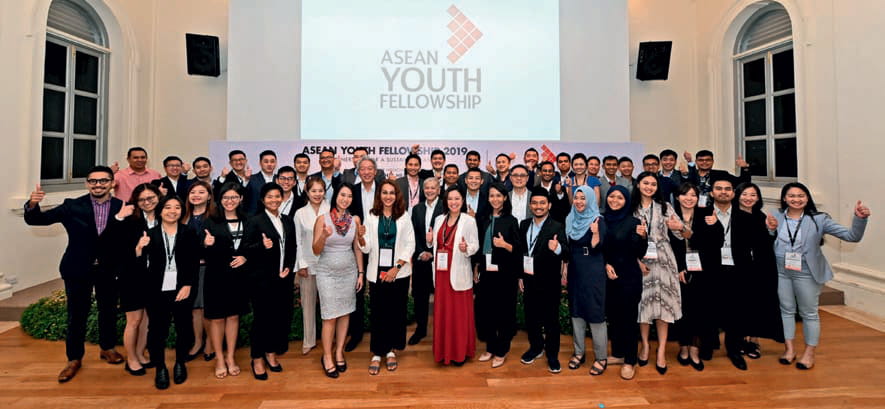
A group of 39 participants attended the second edition of the Asean Youth Fellowship (AYF).
here are many challenges that we share [as Asean] that includes climate change, inefficient waste management systems and the lack of incentives for sustainable business practices. Yet, there are also many best practices in our region that once we share and learn, can be applied back in our own countries.”
This was how 31-year-old Vietnamese Phan Hoang Lan effectively summed up the 2nd Asean Youth Fellowship (AYF) programme. Lan was one of 39 young leaders from the region who converged in Singapore from September 28 to October 5, 2019 for the leadership development programme. Their aim? To exchange ideas, discuss pressing issues and explore opportunities to collaborate for sustainable partnerships.
Jointly organised by the Singapore International Foundation (SIF) and National Youth Council (NYC), the AYF comprises next-generation leaders from the public, private and people sectors who have been identified as having the potential to take on prominent leadership positions in the future.
Themed, “Partnerships for a Sustainable Asean”, this year’s programme focused on the importance of warm people-to-people relations to ensure the social, environmental and economic sustainability of the region.
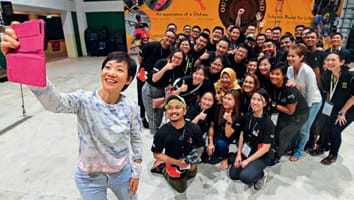
Ms Grace Fu, Minister for Culture, Community and Youth (far left) interacted with the participants of the second edition of Asean Youth Fellowship.
Participants had the opportunity to meet with distinguished thought leaders and political office holders, including Mr Teo Chee Hean, Singapore’s Senior Minister and Coordinating Minister for National Security; Ms Grace Fu, Minister for Culture, Community and Youth; Ms Sim Ann, Senior Minister and Senior Minister of State (MCI & MCCY); as well as Dr Tan Wu Meng, Senior Parliamentary Secretary for Ministry for Foreign Affairs and Ministry for Trade & Industry. At a closed-door dialogue, for instance, Fellows engaged Mr Teo on topics ranging from the growth of Asean as a collective bloc amid economic and security challenges, to empowering the youth to build the Asean narrative.
One participant who said these sessions gave her much food for thought was Bruneian Fellow Wan Nurul Naszeerah.
An army lieutenant who conducts medical training and research by day, she had started a platform that enables those with specific skill sets to conduct workshops for an income in a bid to alleviate the lack of employment opportunities among Bruneians. These courses run the gamut from training future baristas to teaching sound engineering and sign language. Since its inception last year, BenchLab has conducted more than 250 courses and workshops, and it now has about 2,000 users.
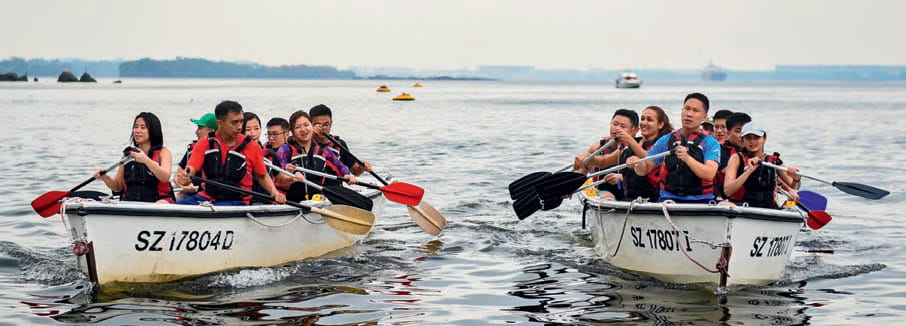
The 2019 AYF Fellows bonded over outdoor teambuilding activities.
“I spoke to Dr Tan about my social programme model and he suggested that I could look at Singapore’s SkillsFuture model as a reference,” she says.
SOLVING SUSTAINABILITY ISSUES
To drive discussions on sustainability, they embarked on dialogue sessions with banking and financial services institution DBS Group and property developer Capitaland, as well as a visit to Semakau Landfill to learn about sustainable waste management in land-scarce Singapore.
During the DBS session, participants were asked how they would use $10 million to achieve sustainable goals. “I said I would invest it in education, especially for the underprivileged,” says Myanmarese Fellow Lachmi Bamiya and the co-founder of independent media outlet Icarus Media.
“This is so that everyone can have access to information, which can be used to improve the quality of our thinking and way of life.”
For Danial Fahmi, Malaysian Fellow and founder of several green technology companies, it was the RE100 pledge – a global corporate leadership initiative that brings together influential businesses committed to 100 per cent renewable electricity – undertaken by Capitaland that truly impressed him. “In Malaysia, we are still using the Green Building Index, which is benchmarked against the EU standards. But these standards don’t really suit the hot and humid climate of our country,” he explains.
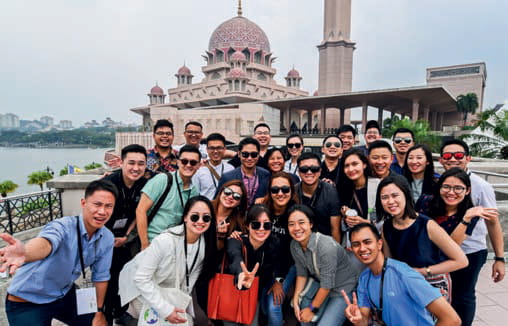
The young leaders undertook a trip to Malaysia’s federal capital, Putrajaya, to learn about the country’s entrepreneurial landscape.
The exposure to the corporate sector was useful for Fahmi to gain a first-hand understanding on how they implement the United Nations Sustainable Goals according to their capabilities.
“We’ve already adopted several components of these goals – such as affordable clean energy and responsible consumption and production – within our business to ensure we are maximising our commercial and social responsibility for a more sustainable economy,” he explains.
“The AYF enabled me to understand that we can make our business more holistic by integrating it with the renewable energy component.”
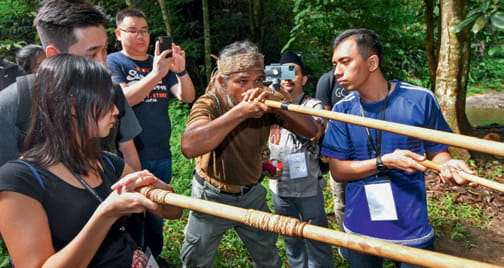
On the learning journey to Malaysia, the Fellows experienced the traditional practices of the indigenous community, known locally as Orang Asli.
Following its inaugural success last year, the programme was further expanded to include a component in Kuala Lumpur to augment exchanges and opportunities for collaboration. The value of forging a regional network of youth leaders who wanted to give back to the community was evident, with this overseas component organised by the 2018 Malaysian Fellows.
The learning journey included a visit to MaGIC (Malaysian Global Innovation & Creativity Centre) for an overview of the start-up and entrepreneurship ecosystem in Malaysia; a discussion on sustainable practices at one of Malaysia’s largest plantation companies; as well as a meeting with Mr Syed Saddiq, Malaysia’s Minister of Youth and Sports.
“Learning Has No Boundaries And – Whether Developed Or Not – Each Country Has Unique Skill Sets To Offer Through Its People. It Is Important That We Recognise The Potential In Connecting And Empowering All People Across Asean.”
“I’m pleased to have met these young Asean Leaders from the AYF programme who are making an effort to drive change for the future,” shares Mr Saddiq. “The youth need to be our agents of change, as they are the leaders of tomorrow. Getting them to take an active interest in solving social issues has always been a challenge.
Hopefully, these advocates are able to change that.”
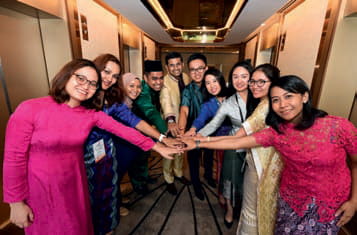
In keeping with the mandate of the programme, participants exchanged ideas with each other that can be applied across the region.
PROGRESSING TOGETHER
The fact that Fellows from the previous year’s programme have followed up on their pledges for personal action to give back to the Asean community is a positive sign. In addition to the Malaysian Fellows, Vietnamese Harry Pham became the SIF’s first representative in Ho Chi Minh City last June. In his new capacity, he plays a key role in supporting the SIF’s mission to connect Singaporean and Vietnamese communities through project collaborations aimed at strengthening people-to-people relations between the countries.
From the Philippines, Fellow Anna Karina Jardin embarked on Artdialogo 2019 – an art exhibition and cross-cultural workshop – in partnership with Malaysian Christine Cheah and Singaporean Soh Yida to mark 50 years of Philippine-Singapore bilateral relations.
Having gone through the AYF experience, Wan Nurul plans to explore partnerships with some of the other Fellows to promote the culture of skill-sharing practised by BenchLab. “Learning has no boundaries and – whether developed or not – each country has unique skill sets to offer through its people. It is important that we recognise the potential in connecting and empowering all people across Asean,” she says.
